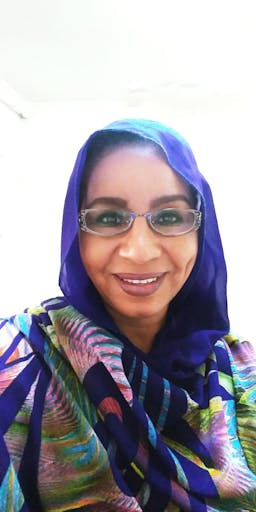"She’s Worth Less Than a Bullet in the Head!"
Jan 21, 2015
Story
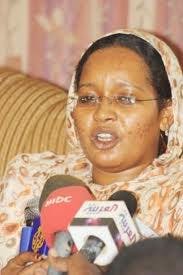
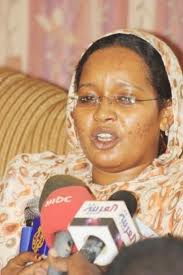
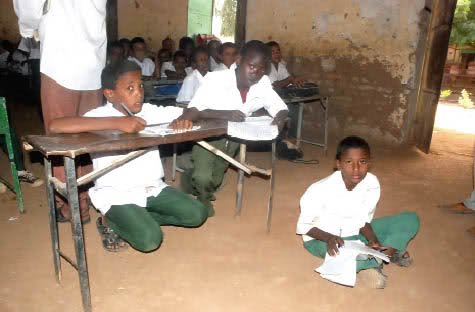
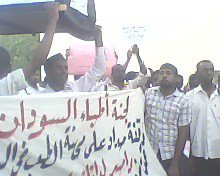
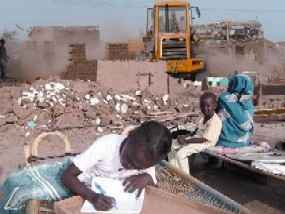
"Hey there! I am from the Sudanese Security and Intelligence Service (NISS) and I will follow you, starting from this day, everywhere you go, so you don't get killed." In this strange, puzzling and threatening way, a young man in plain clothes presented himself a month ago to Dr. Nahid M Alhassan Ali, World Pulse member and Sudanese registrar.(http://www.worldpulse.com/user/6313).
Mrs. Alhassan was the Media Secretary and spokeswoman for the Doctors' Strike Committee.
"Who wants to kill me?" asked she.
"Who knows?" was his answer.
"Who are you? What is your name? Who is planning to kill me and why?
Since when have the security forces have changed their tactics from kidnapping, detaining and raping to protection?" asked a surprised, furious and scared Dr. Nahid. But she received no answer from his side. His message was short but heavy in meaning: you are in great danger!
This incident occurred the same day the Doctors Strike Committee held their meeting and silent demonstration inside Khartoum hospital to urge the Sudanese government fulfill its previous promises of improving working conditions.
After the end of the demonstration, Mrs. Alhasan found out that the man was serious. She had been followed to her office at Psychiatric Hospital where she worked. Since then she had been hunted not by him alone, but six in a van and two on motorcycle.
Since then, every single second in her life was calculated, as if they wanted to register everything she did on real time. Just like software monitoring activities on someone's computer.
The monitoring is constant. When she reaches the hospital in the morning, a new shift of guards replaces the old ones. They even dare to sit with her in her office.
Once, one of them insisted on attending a short briefing for the Doctors Committee that she was giving during break time, When asked what he was doing, his answer was so rude: "I want to report about the activities of this meeting."
Her cell phone, land line and emails are monitored as well as to her husband's. Relatives and friends are cautious not to contact her directly. "I feel that I am going to be like a contagious disease", she said.
Relatives, to escape frequently interrogated by the NISS agents on the purpose of coming to Alhassan's home, spaced their visits and future resolutions and plans of the Doctors Committee resorted to phone briefings.
Mrs. Alhasan, if not considered the number one activist in Sudan, is noted among the prominent activists who could, bravely, go so far as to defend their opinions and beliefs.
Syndicalism, writing, activism and, tripled with World Pulse membership, are activities Khartoum regime considers punishable and not tolerable.
Anyone who is "caught red handed" in such activities will be exposed to ill-treatment, doubled by sexual harassment, raping and lashing. In this way, Lubna Hussein and Safia Ishag have fled Khartoum and Nahid is being pushed to follow the same itinerary.
Last year under her co-leadership, the Doctors' Committee led three strong strikes, where they were exposed to ill-treatment, including detention and beatings. The following link contained interesting coverage of doctors demands which they raised last year asking for an improved work environment (http://www.worldpulse.com/node/18723).
To downplay the impact of the strike, the health ministry claimed that a committee was examining the restructuring of wages and would submit recommendations to the government but saying this will take some time.
Months passed, and none of the promises were fulfilled. The number of doctors who fled the country rose to 5000 in less than two years' time. Others preferred to stayed and continued giving their services in the same miserable conditions, hoping the situation might change one day. Nahid was among those who stayed, in spite of good offers she personally received to work abroad.
"We want a better work environment, a salary that enables a doctor to make ends meet, pending salaries, free medical treatment, is that too much for us? We are working in unimaginable conditions", she complains over Skype.
Last year a doctor died while he was on duty. The hospital in which he worked and died refused to release his body unless his family paid the cost of his treatment and the two days his corpse stayed in the morgue.
As a cultured syndicalist, activist and psychiatrist, Nahid is a well known figure to local and international media. These activities that push the authorities to continue attempting to control her.
It seems that the NISS plans to kill her personality. Seemingly, they have no intention to apprehend or arrest or indict her formally. Learning from previous mistakes, they don't want to make another victim like Lubna Hussein (http://www.worldpulse.com/node/11570) or Safia Ishaq (http://www.worldpulse.com/node/35125). The first was sentenced to flogging for wearing pants, the latter raped for her opposing activities. Silencing Nahid or pushing her to seek refuge elsewhere is the goal; no other alternative. To achieve this goal, it seems that there are no limits to their cruelty and atrocities.
Putting her on the verge of collapse, NISS agents question her children and visitors. Their car blocks the entrance to her home, they watch all her family's daily activities. If she is absent and out of their watch or control for a short time, they don’t hesitate to contact her husband and order him to bring her home as soon as possible. She recalled that once she managed to escape from their control and drove her car to another area (Kalakla), about 30 km south of Khartoum, to visit her sick father. Half an hour later, they called her husband asking him either to provide them with a drawing for her family' house map or bring her home immediately. They claimed this was the request of a NISS senior official. When her husband refused and argued angrily with them, they told him she was not worth less than a bullet in the head.
"My parents were so upset to see me leaving the same moment I arrived, especially as I wanted to take my sick father to hospital and get him examined", she complained.
In the meantime, while the story of calling her from her father’s house, was still fresh, the security agents sent her a text message stating that they could lift the state of monitoring on condition that she didn't attend a doctors' meeting that was scheduled for upcoming days.
Putting her under their sway seems to be the target of their manipulation and intimidation.
"If I yield, other demands will follow to make me kneel down and put me under their sway, but I will never give them that chance, NEVER" she insisted.
By insisting on not obey their orders, they increased their grip and intensified monitoring and demands. They started tailoring her social activities and determining where to go and when to come back, which activity to attend and which to ignore. They want her in their sight always. Only bed time separates her from their round-the-clock monitoring.
That was not the first time that she came into friction with Sudanese authorities. Previously she was subjected to detention, hiding, and undertook a hunger strike, but she describes this surveilance as a "different new technique".
“I don't feel safe to walk down the street . I feel terrified every time the door bell rings or my kids are late from school. I am scared to talk over the phone, to leave the house in the morning or come back in the evening. I will not be astonished if find them one night inside my bedroom, with the pretext of checking whether am still there or not," she complains.
Mrs. Alhasaan is mother of four children Mohammed,16-year- old, Nur 8- year - old, Sura 6- year- old and Mahmoud who is almost 5-year-old. “Luckily my elder son knows nothing of what is happening because he is travelling abroad, but am anxious that he may come home suddenly and find out. I can't predict what the outcome will be," she said.
It seems that since she has started her activism, she has never experienced a moment of tranquility or quietude of mind. If the NISS doesn't stop , investigate, or cause her moral or material damage now, that is very likely will be next moment.
Last year, Nahid's car was destroyed and her maid interrogated and beaten up. She, herself, was chased and forced to take refuge in the UN's building for a couple of hours and at last she went into hiding. For three weeks she hid and cut all contacts with her family.
Having passed three weeks away from her family, she considered those days to be her worst moments in life, because she missed the annual graduation and promotion of her son, Mahmoud, aged 5, from KG2 to Gr. 1, an eagerly awaited annual celebration. The justifications she gave for her compulsory absence were not satisfactory to her son. Though her husband Shams Eldeen , who she describes as a loving, understanding, cooperative and committed man, did his best to make the occasion go "smoothly".
The NISS heard a rumor that Dr. Nahid was preparing to attend a medical conference in the USA. So a couple of times, when she and her husband were away, agents came behind their backs and interrogated their small kids about her travel plans
Instead of confining their activities to routine collecting and analyzing information, the NISS is precisely "declaring war" against Sudanese people , particularly women. They intensified the use of harassment, rape and ill-treatment. There is no limit to their war to silence opponents. They use their sweeping powers and dirty weapons to arrest and detain females suspected of opposing the ruling National Congress Party (NCP).
During last year, hundreds of people, if not thousands, were subject to arrest, torture and harassment. Doctors were no exception. A large number of them fled the country, whereas their committee still struggles to fulfill their pending demands.
At first Nahid was not enthusiastic to talk about this systematic intimidation, least her elderly parents became worried .
But under the pressure of some friends and her growing fear and anxiety, she decided to go public and highlight the case.
As an ardent opponent to the regime's injustice, Mrs. Alhasan is one of the strongest voices condemning social, political and economical injustice done to women, children and doctors and its consequence to health and society at large.
As a member of the "No to Women’s Suppression Initiative" (NWSI), she participated in all protests and was thereby subjected to all types of interrogations and detentions. She also scored a tremendous success in sparing pupils in primary schools officially backed corporal punishment.
As she wrote in her World Pulse page entitled: "Their Stories Are Mine", "After three years of working with different teaching staff and the Ministry of Education in Khartoum, finally the ministry (decision no.10 for year 2010) incriminating corporal punishment in primary schools"
As a psychiatrist, she is so active in the field of raising awareness, giving lectures to empower women and children at large. Her statements in a number of famous TV programs condemning women’s sexual harassment in public transportation, child molesting and corporal punishment of children in primary schools, are still echoed and quoted.
But In spite of creating a positive change and an amazing achievement in the education system (incriminating corporal punishment), of which even the NISS agents, as parents, are beneficiaries, it seems that they have already taken the decision to silence her and put an end to her activities.
Nahid's case reflects violence led by the state against women, in the absence of strong trade unions to defend women's rights. With the exception of NVAW, the role of women's organizations during the reign of this government remains weak and distracted, in spite of the glorious and pioneering past.
It is unfortunate that society’s efforts to defend human rights defenders are scattered and weak, faced with the growing violations of human rights in Sudan. Networking efforts could be an effective solution for linking women in a vast country and could begin to compensate for lack of direct contact with concerned bodies, locally and internationally.
